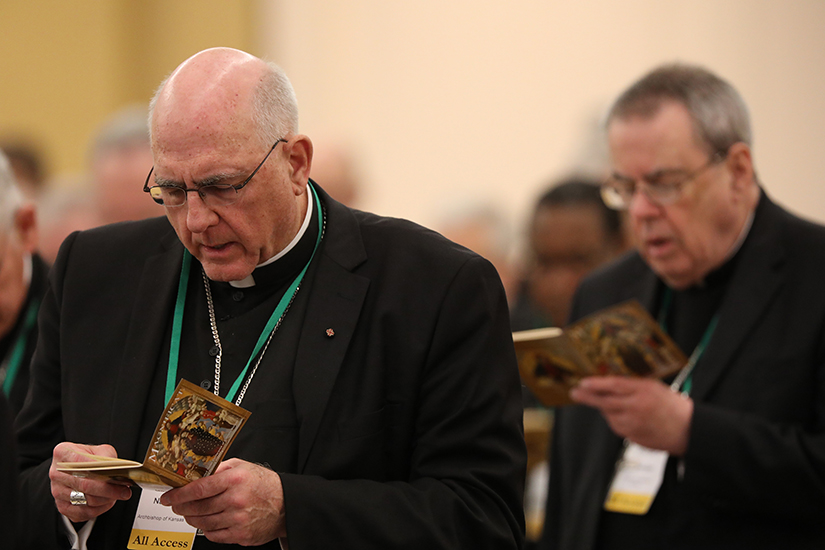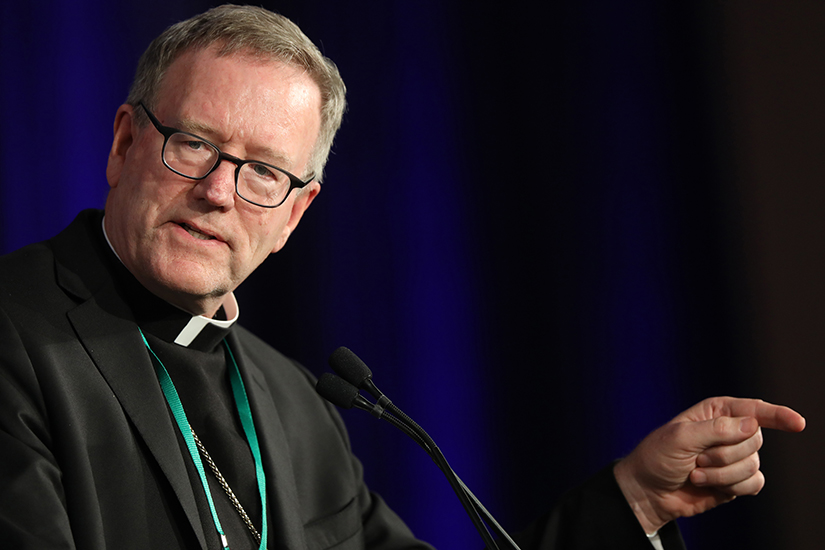 Archbishop Joseph F. Naumann of Kansas City, Kan., chairman of the U.S. bishops’ Committee on Pro-Life Activities, prayed the opening prayer of the annual general assembly of the USCCB in Baltimore June 11.Photo Credit: Bob Roller | Catholic News ServiceBALTIMORE — At the start of the June 11-13 spring assembly of the U.S. bishops in Baltimore, it was clear the bishops had a task at hand: to respond to the sexual abuse crisis in the Church.
Archbishop Joseph F. Naumann of Kansas City, Kan., chairman of the U.S. bishops’ Committee on Pro-Life Activities, prayed the opening prayer of the annual general assembly of the USCCB in Baltimore June 11.Photo Credit: Bob Roller | Catholic News ServiceBALTIMORE — At the start of the June 11-13 spring assembly of the U.S. bishops in Baltimore, it was clear the bishops had a task at hand: to respond to the sexual abuse crisis in the Church.
Several speakers addressing the group discussed the challenge ahead and the need for the bishops to be both transparent and reliant upon lay leadership. The bishops also examined their plans to vote on procedures and policies in response to the abuse crisis, including some they had put aside during their fall general assembly in November at the Vatican’s request.
On June 13, they voted to implement the document "Vos Estis Lux Mundi" ("You are the light of the world"), issued by Pope Francis in May to help the Catholic Church safeguard its members from abuse and hold its leaders accountable.
The bishops also approved the document "Acknowledging Our Episcopal Commitments" and promised to hold themselves accountable to the commitments of the charter, including a zero-tolerance policy for abuse. The document says any codes of conduct in their respective dioceses regarding clergy apply to bishop as well.
They voted in favor of the item "protocol regarding available nonpenal restrictions on bishops," which outlines what canonical options are available to bishops when a retired bishop resigns or is removed "due to sexual misconduct with adults or grave negligence of office, or where subsequent to his resignation he was found to have so acted or failed to act."
Their first action was a vote June 12 to authorize the implementation of a third-party system that would allow people to make confidential reports of abuse complaints against bishops through a toll-free telephone number and online. The system, which would be operated by an outside vendor contracted by the U.S. Conference of Catholic Bishops, should be in place no later than May 31, 2020.
The bishops' postponement of voting on these procedures was addressed from the meeting's onset June 11 in a message from Archbishop Christophe Pierre, the Vatican's nuncio to the United States.
“Working together provides us with the opportunity to speak and to listen,” said the message from Archbishop Pierre, read by Msgr. Walter Erbi, charge d’affaires at the Vatican’s nunciature in Washington. Archbishop Pierre was at the Vatican for a nuncio meeting.
He said that despite the desire among U.S. bishops in November to act quickly to address new crises on clergy sex abuse, the postponement of the votes on the issue allowed the U.S. Church to participate more fully at the Vatican’s February summit on the protection of minors.
Moving forward was certainly a theme of the day, echoed by National Review Board chairman Francesco Cesareo, who called for a greater role for laity in investigating allegations of abuse or reaction to reports of abuse against bishops.
Cesareo also said National Review Board members recommend a thorough review of the “Charter for the Protection of Children and Young People” and a revision in the audit process regarding diocesan implementation of the charter, which governs the Church’s response to clergy abuse allegations.
“A strengthened audit would provide a means for improving your dioceses’ existing methods to protect and heal,” Cesareo said. “Virtually all your dioceses, including those where problems came to light under the microscope of the media and attorney generals, have easily passed the audit for years since the bar currently is so low. Now is the time to raise the bar on compliance to ensure the mistakes of the past are not repeated.”
Cesareo also recommended that the charter “should be revised immediately to explicitly include bishops and demand for greater accountability.”
The bishops also discussed the upcoming election, the crisis at the border and the issue of young adults leaving the Church.
They were urged to do more to support the suffering of immigrant families, to be with them spiritually as pastors and to voice support for legal measures to help them.
 Los Angeles Auxiliary Bishop Robert E. Barron spoke on the first day of the spring general assembly of the U.S. Conference of Catholic Bishops in Baltimore June 11.Photo Credit: Bob Roller | Catholic News ServiceAuxiliary Bishop Robert E. Barron of Los Angeles, chairman of the bishops’ Committee on Evangelization and Catechesis, spoke about an upcoming presentation at the fall meeting on how to respond to the growing number of young people leaving the Church.
Los Angeles Auxiliary Bishop Robert E. Barron spoke on the first day of the spring general assembly of the U.S. Conference of Catholic Bishops in Baltimore June 11.Photo Credit: Bob Roller | Catholic News ServiceAuxiliary Bishop Robert E. Barron of Los Angeles, chairman of the bishops’ Committee on Evangelization and Catechesis, spoke about an upcoming presentation at the fall meeting on how to respond to the growing number of young people leaving the Church.
He said getting the religiously unaffiliated, or “nones,” particularly young people, back to the Catholic Church, should be a top priority for the Church, noting that 50% of Catholics 30 years old and younger have left the Church.
“Half the kids that we baptized and confirmed in the last 30 years are now ex-Catholics or unaffiliated,” he said, and “one out of six millennials in the U.S. is now a former Catholic.”
In anticipation of the 2020 presidential election, the U.S. bishops’ quadrennial document that provides guidance to voters on Catholic social teaching won’t change, but it will be supplemented by a brief letter and four 90-second videos that reflect the teaching of Pope Francis, the bishops were told.
The bishops also are voting on other issues not related to the abuse crisis at the spring assembly. They are to decide whether to approve a revised national directory on formation and ministry for permanent deacons, if they should update texts for the ordination of clergy, and revise a passage to the U.S. Catechism for Adults about the death penalty.